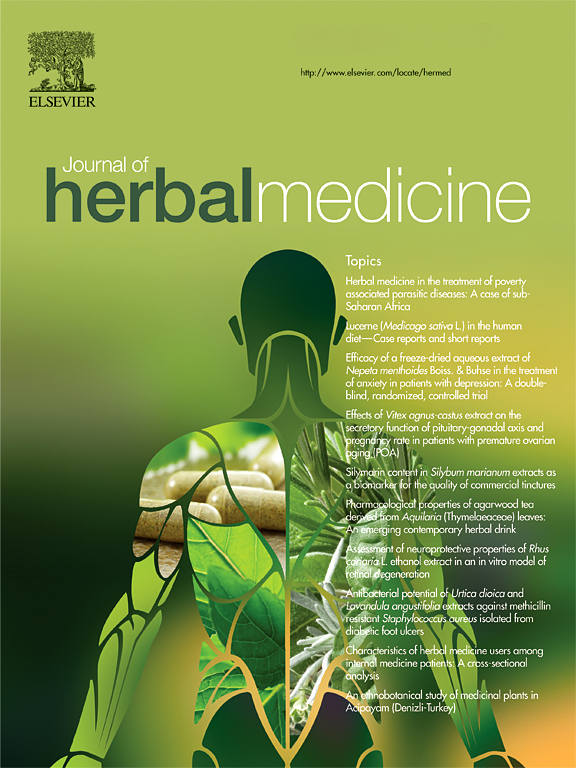健脾益气益髓治疗MG的中药方剂:网络荟萃分析
IF 1.9
4区 医学
Q2 INTEGRATIVE & COMPLEMENTARY MEDICINE
引用次数: 0
摘要
重症肌无力是一种自身免疫性疾病,主要影响神经肌肉连接处突触后膜上的乙酰胆碱受体。中药复方TSQNM在治疗重症肌无力方面已被广泛应用于临床,并显示出良好的疗效。中药方剂种类繁多,疗效各异,但缺乏它们之间的直接比较证据。采用贝叶斯网络meta分析评价健脾益气益髓中药方剂(简称TSQNM)治疗重症肌无力的临床疗效和安全性。该结果有望为重症肌无力的治疗提供有价值的见解。方法从数据库建立至2023年10月17日的随机对照试验中检索。使用Cochrane Collaboration开发的偏倚风险评估工具评估研究的质量。它还在PROSPERO (ID: CRD42023482260)中进行了预注册。采用STATA16和R4.2.3进行网络meta分析。结果共纳入20项研究,共纳入受试者1 473例,其中实验组739例,对照组734例。这些研究检验了八种中药方剂的有效性。结论传统西药联合中药复方对重症肌无力患者的治疗效果优于单用处方药。值得注意的是,补中益气汤与西医常规治疗相结合,对减轻激素性肥胖和胃肠道不适有显著疗效。本文章由计算机程序翻译,如有差异,请以英文原文为准。

TCM formulas for strengthening the spleen, tonifying Qi, and supplementing the marrow in the treatment of MG: A network meta-analysis
Introduction
Myasthenia gravis is an autoimmune disease that primarily affects the acetylcholine receptors on the postsynaptic membrane at the neuromuscular junction. Traditional Chinese medicine (TCM) TSQNM formulas have been widely utilized in clinical practice and have shown effectiveness in treating Myasthenia gravis. There is a broad spectrum of TCM formulas with varying effectiveness, but there is a lack of direct comparative evidence between them. Bayesian network meta-analysis was utilized to evaluate the clinical efficacy and safety of TCM formulations that focus on spleen tonification, qi enhancement, and marrow nourishment (referred to as TSQNM) for treating myasthenia gravis. The results are anticipated to provide valuable insights into the treatment of myasthenia gravis.
Methods
Pertinent randomized controlled trials were retrieved from databases from the inception of the databases to October 17, 2023. The quality of studies was assessed using the risk of bias assessment tool developed by the Cochrane Collaboration. It was also preregistered in PROSPERO (ID: CRD42023482260). Network meta-analysis was conducted using STATA16 and R4.2.3.
Results
Twenty studies were included, involving 1 473 participants, with 739 cases in the experimental group and 734 cases in the control group. These studies examined the effectiveness of eight TCM formulas.
Conclusions
Combining conventional Western medicine treatment with TSQNM formulas has been shown to provide superior therapeutic effects for patients with myasthenia gravis, compared to using prescription drugs alone. Notably, when Buzhong Yiqi Decoction is combined with conventional Western medicine treatment, it has shown remarkable efficacy in reducing hormone-induced obesity and gastrointestinal tract discomfort.
求助全文
通过发布文献求助,成功后即可免费获取论文全文。
去求助
来源期刊

Journal of Herbal Medicine
INTEGRATIVE & COMPLEMENTARY MEDICINE-
CiteScore
3.90
自引率
0.00%
发文量
94
期刊介绍:
The Journal of Herbal Medicine, the official journal of the National Institute of Medical Herbalists, is a peer reviewed journal which aims to serve its readers as an authoritative resource on the profession and practice of herbal medicine. The content areas of the journal reflect the interests of Medical Herbalists and other health professionals interested in the clinical and professional application of botanical medicines. The objective is to strengthen the research and educational base of herbal medicine with research papers in the form of case studies, original research articles and reviews, monographs, clinical trials and relevant in vitro studies. It also publishes policy statements, opinion pieces, book reviews, conference proceedings and profession related information such as pharmacovigilance reports providing an information source for not only the Herbal Practitioner but any Health professional with an interest in phytotherapy.
 求助内容:
求助内容: 应助结果提醒方式:
应助结果提醒方式:


